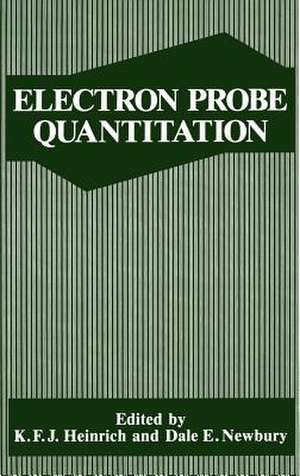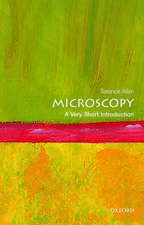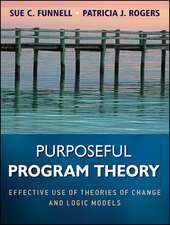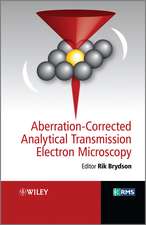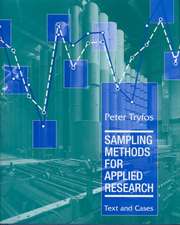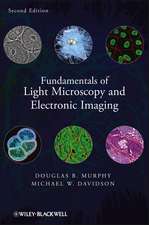Electron Probe Quantitation
Editat de K.F.J. Heinrich, D. Newburyen Limba Engleză Hardback – 29 iun 1991
| Toate formatele și edițiile | Preț | Express |
|---|---|---|
| Paperback (1) | 1216.91 lei 6-8 săpt. | |
| Springer Us – 29 mai 2013 | 1216.91 lei 6-8 săpt. | |
| Hardback (1) | 1228.47 lei 6-8 săpt. | |
| Springer Us – 29 iun 1991 | 1228.47 lei 6-8 săpt. |
Preț: 1228.47 lei
Preț vechi: 1498.13 lei
-18% Nou
Puncte Express: 1843
Preț estimativ în valută:
235.08€ • 251.37$ • 195.99£
235.08€ • 251.37$ • 195.99£
Carte tipărită la comandă
Livrare economică 18 aprilie-02 mai
Preluare comenzi: 021 569.72.76
Specificații
ISBN-13: 9780306438240
ISBN-10: 0306438240
Pagini: 400
Ilustrații: VIII, 400 p.
Dimensiuni: 156 x 234 x 24 mm
Greutate: 0.75 kg
Ediția:1991
Editura: Springer Us
Colecția Springer
Locul publicării:New York, NY, United States
ISBN-10: 0306438240
Pagini: 400
Ilustrații: VIII, 400 p.
Dimensiuni: 156 x 234 x 24 mm
Greutate: 0.75 kg
Ediția:1991
Editura: Springer Us
Colecția Springer
Locul publicării:New York, NY, United States
Public țintă
ResearchDescriere
In 1968, the National Bureau of Standards (NBS) published Special Publication 298 "Quantitative Electron Probe Microanalysis," which contained proceedings of a seminar held on the subject at NBS in the summer of 1967. This publication received wide interest that continued through the years far beyond expectations. The present volume, also the result of a gathering of international experts, in 1988, at NBS (now the National Institute of Standards and Technology, NIST), is intended to fulfill the same purpose. After years of substantial agreement on the procedures of analysis and data evaluation, several sharply differentiated approaches have developed. These are described in this publi cation with all the details required for practical application. Neither the editors nor NIST wish to endorse any single approach. Rather, we hope that their exposition will stimulate the dialogue which is a prerequisite for technical progress. Additionally, it is expected that those active in research in electron probe microanalysis will appreciate more clearly the areas in which further investigations are warranted.
Cuprins
Early Times of Electron Microprobe Analysis.- Strategies of Electron Probe Data Reduction.- An EPMA Correction Method Based upon a Quadrilateral ?(?z) Profile.- Quantitative Analysis of Homogeneous or Stratified Microvolumes Applying the Model “PAP”.- ?(?z) Equations for Quantitative Analysis.- A Comprehensive Theory of Electron Probe Microanalysis.- A Flexible and Complete Monte Carlo Procedure for the Study of the Choice of Parameters.- Quantitative Electron Probe Microanalysis of Ultra-Light Elements (Boron-Oxygen).- Nonconductive Specimens in the Electron Probe Microanalyzer — A Hitherto Poorly Discussed Problem.- The R Factor: The X-Ray Loss due to Electron Backscatter.- The Use of Tracer Experiments and Monte Carlo Calculations in the ?(?z) Determination for Electron Probe Microanalysis.- Effect of Coster-Kronig Transitions on X-Ray Generation.- Uncertainties in the Analysis of M X-Ray Lines of the Rare-Earth Elements.- Standards for Electron Probe Microanalysis.- Quantitative Elemental Analysis of Individual Microparticles with Electron Beam Instruments.- The f(?) Machine: An Experimental Bench for the Measurement of Electron Probe Parameters.- Quantitative Compositional Mapping with the Electron Probe Microanalyzer.- Quantitative X-Ray Microanalysis in the Analytical Electron Microscope.
